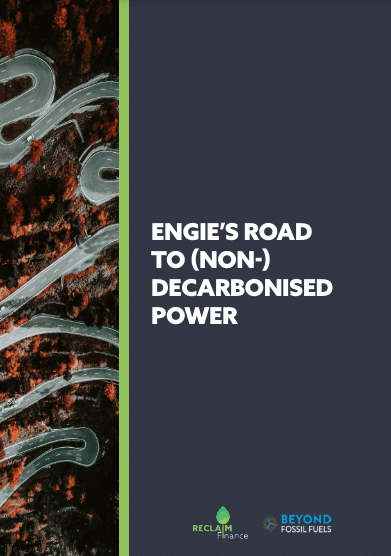
ENGIE’s road to (non-)decarbonized power
Decarbonizing the energy sector is urgent. Technological solutions are available and conditions are particularly good for their development. In this context, electricity producers play a central role and must implement comprehensive and robust transition plans. ENGIE is both one of the largest independent global producers – with over 100GW of installed capacity, and one of Europe’s most emitting companies and must therefore rise to the challenges of transforming the sector. As ENGIE’s annual General Assembly approaches, Reclaim Finance provides an analysis of the Group’s Climate Plan in light of the Net Zero Emissions (NZE) scenario from the International Energy Agency (IEA).
Key findings:
- Gas expansion remains on the agenda and no commitment to end fossil fuel development has been made. Investments in new fossil assets are planned, and the supply of Liquefied Natural Gas relies on contracts extending beyond 2040.
- ENGIE’s Climate Plan relies on the development of immature technologies, not deployable at a large scale or incompatible with a just and rapid transition of our energy system – such as hydrogen, biomethane, or Carbon Capture, Utilization and Storage.
- The development of sustainable energies (wind, solar) by 2030, while significant, is insufficient for a deep decarbonization pathway of the energy sector, and the expected gains are at high risk of being jeopardized by locking in fossil infrastructure.
- The Group’s targets do not allow for achieving “Net zero emissions” before 2045 (compared to 2035/2040 according to the NZE scenario) and present significant uncertainties that cast doubt on its ability to meet its own objectives: potential emission rebounds by 2030, partially addressed methane emissions, partially uncovered scopes and value chains in absolute emissions…
In order to reassure its investors on its ability to achieve its own objectives, and to strengthen them towards a 1.5°C trajectory, ENGIE must commit to stopping any gas expansion and directing all its investment towards sustainable solutions (wind, solar, storage capacity, network flexibility). The development of highly questionable technologies regarding their impacts on climate and biodiversity (biogas, hydrogen, CCUS), and presenting a major risk of locking in fossil assets, cannot be pursued by the French company. Greater transparency and clarity in the medium and long-term targets displayed by ENGIE is essential for a better understanding of the necessary transformation for the energy production sector and must be disclosed to its investors.
